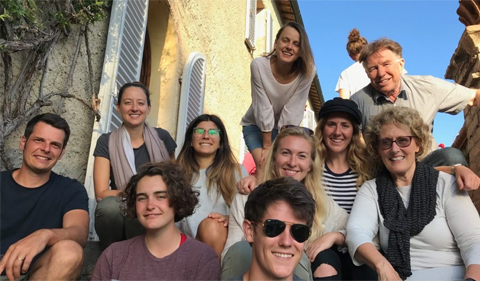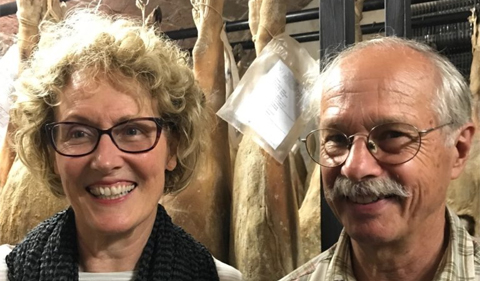
Theresa Moran and David Bell with Rita Góralska (back center) Educational Director, and the Spannocchia Interns
Dr. David Bell, Associate Professor and Chair of Linguistics, and Dr. Theresa Moran, Director of the Food Studies theme, spent the early summer of 2018 giving talks in Umbria and Tuscany.
At the 2018 Perugia Food & Sustainability Studies Conference: “Exploring Ethics through Food Choices” held, at the Umbra Institute in Perugia, Italy, Bell and Moran gave a talk titled “Superfine quality, absolute purity, daily freshness: United Cattle Products’ marketing of tripe in the face of ridicule, disdain and disgust.”
Tripe is the muscle wall of cow stomach.
United Cattle Products, established in 1920, operated 166 restaurants and retail establishments and 12 factories in and around Manchester, in the north west of England. UCP cafes were as popular as McDonald’s are today. Bell revealed that he had grown up in Manchester eating honeycomb tripe. Drawing on promotional advertising in local newspapers, Bell and Moran examined the strategies UCP used to market the eating of tripe.
Later, Bell and Moran were invited to delve further into the history of tripe eating at the Tenuta di Spannocchia, a 1,100-acre organic farm with roots dating back to 1225 and located in a nature reserve in the hills of Tuscany.
As well as providing a retreat for scholars, artists, musicians and environmentalists, Spannocchia offers a unique farm internship program in diversified organic farming, butchering, and agritourism. Interns at Spannocchia this summer included students from Berea College and University of Kentucky.
In their talk, Bell and Moran explored the decline of tripe eating in Britain and the rise of “big chicken” and cheap industrial meats. UCP hung on until the 1990s, when it finally went out of business. But the deeper and more disturbing cause of tripe’s decline can be seen in the constant and arguably unethical undermining of a community’s foodways through ridicule, disdain of a food considered to be low class, and the psycho-social disgust of offal as impure.
Tripe eating is alive and well in the many regional tripe dishes in Italy, and the adherence to nose-to-tail eating exemplified in the sustainable agricultural practices championed at Spannocchia.




















Comments